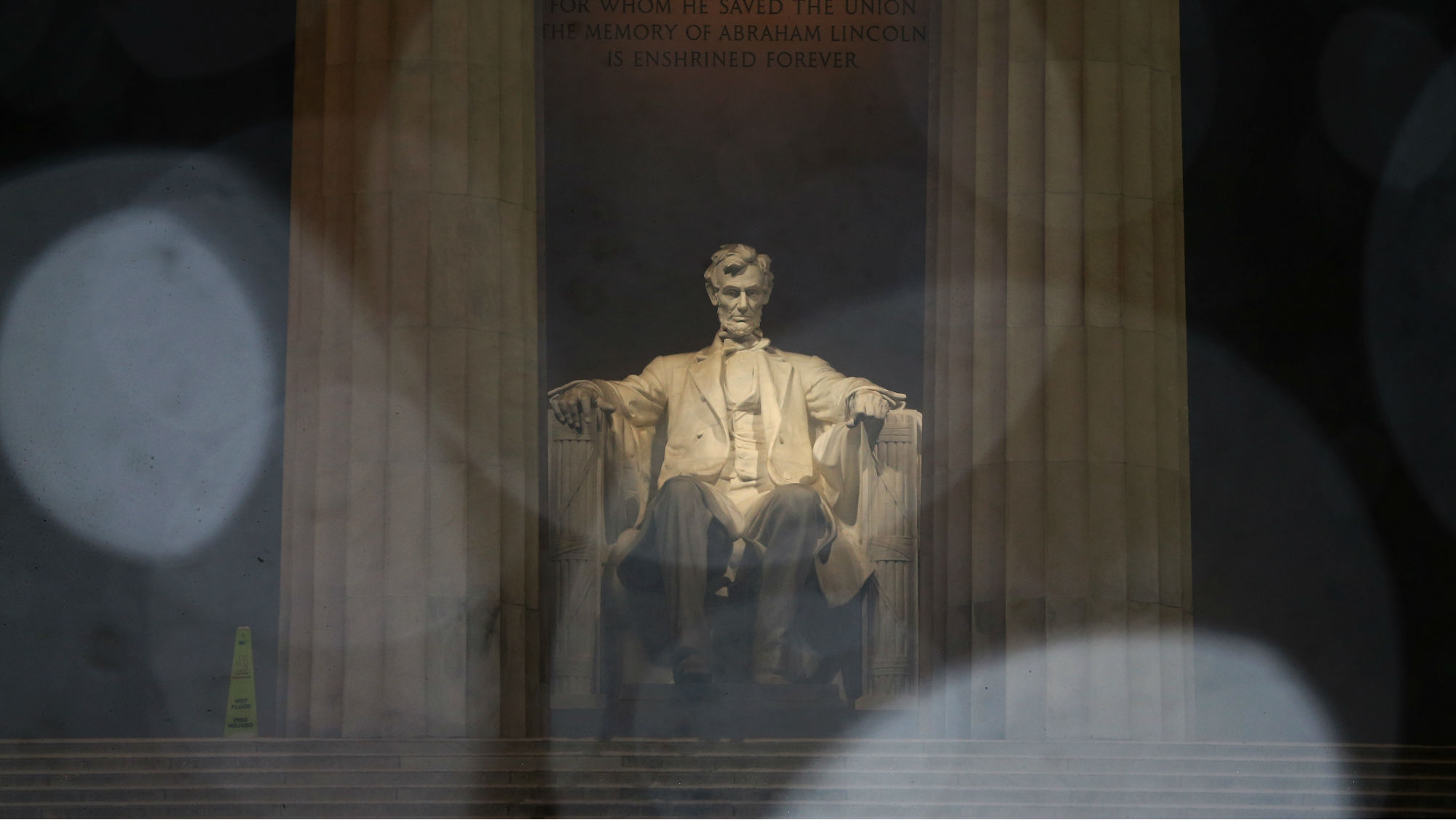I was in Washington this weekend and took the opportunity one night to visit the Lincoln Memorial. Given the way Washington is shaped, the memorial is not something you are likely to happen upon by accident; a visitor must decide to go there. The memorial should be visited at night, when the texture of the sculpture and the somberness of the moment embrace you. You see one hand clenched and another at rest, and wonder what the sculptor meant. The decision to visit the memorial is shaped by a need. I do not visit often, but I do when I feel despair for my country, and when I must remind myself of the vast moral power of the Republic. Abraham Lincoln allows me to leaven that power with his profound sense of humor, absent in the memorial but embodied in his life. That humor, that sense of irony, is essential for softening the harshness of the moral.
The Abraham Lincoln of the memorial is a man who is exhausted and deeply troubled, brooding not only over the future of the nation, or the terrible past that he presided over. It seems to me also a sculpture of a man filled with doubts about himself, his decisions and his failures. To my mind, Lincoln was a good man, and a good man is one who is always more aware of his failures than his triumphs, aware that in spite of all the praise, he did less than he could have done. I imagine him sitting there brooding over the dead, but also brooding over his own decision to allow Grant to fight a war of attrition outside of Richmond. In war, the justification for such decisions is that there would have been more death and suffering from a gentler approach. Lincoln knew that, but he was graced by the ability to also doubt this and be anguished by it.
To do what must be done, to believe completely in what you are doing yet harbor an element of doubt – and even more, sorrow and regret – at what was necessary, is the essential dimension of being moral. I think, or imagine, that I can see that in the face of the sculpture. It is not the evil that you do because you are wicked that is the worst thing; it is the evil that you do because you are good, and that you must do to achieve the good. That haunted Lincoln, and it haunts any nation, especially my own. That is odd because America was born in battle. As a percentage, more Americans died in the revolution than in any other war we fought, and we have gone to war constantly – intending the good, frequently achieving it, yet tortured by our doubt that what we had to do actually had to be done. The Lincoln Memorial embodies this sentiment.
Lincoln was a deeply principled man, but he understood that principles held so tightly that they cannot bend become a means for feeding your own sense of righteousness and superiority over others rather than a guide for improving the world. Lincoln hated slavery, as his debates with Stephen Douglas showed. But he did not run for president on an anti-slavery platform. He knew he could not win if he did, and he knew that if he did not win, none of his principles would have mattered. So he lied. He lied because if he admitted his intent, he would lose the election and the ability to pursue the good. Similarly, in what is my favorite saying of his, he said, “I hope to have God on my side, but I must have Kentucky.” Kentucky was a slave-holding state, and had it joined the Confederacy, the Confederacy’s chances of victory would have surged. Lincoln had to embrace a slave state to abolish slavery.
I think this paradox of being moral amused him more than it embarrassed him. There is a story about his days in the Illinois legislature. A vote came that he wanted to avoid voting on or abstaining from, so he climbed out of the window of the legislative chamber. I can’t imagine him not telling this story to his Cabinet without unabashed glee. For Lincoln, the rigidly moral, the proudly sanctimonious, represented a profound evil. Such people were narcissists rather than moralists. They cared less about succeeding than about sneering. But worse, these were tedious people, unable to laugh at the human condition, unable to laugh at themselves, and therefore not fully human.
But Lincoln’s sensibility did far more than further his ambitions. At the moment of his victory in the Civil War, Lincoln ordered the band to begin the celebration by playing “Dixie,” the anthem of the Confederacy. There is no doubt that he saw the Confederacy as the enemy, but he also understood that no enemy was without virtue and beyond redemption. He understood that at a certain point, reconciliation requires the victor to make the gesture.
It is hard for us to grasp the contempt in which he was held at the time. One Northern abolitionist of great standing called him an ape. Others said he was illiterate. He did not come from Boston, where abolition was a moral absolute, and which had failed for decades to make a dent in slavery but felt superior to the rest of the country. He was a man whose family came across the Appalachians, cleared the land and lived a hard life. Lincoln lived that life, admired it and decided to study law. Lincoln, by all accounts, preferred the law to physical labor. He praised the laborer but avoided hard labor at all cost. I think he was more amused than ashamed by the moral ambiguity of his behavior. For him, consistency was the hobgoblin of small minds.
You should visit the memorial after reading a biography of the man. You will then recognize the reasons for his exhaustion and doubt. But you can also imagine how hilarious the thought would have been to him that anyone would visit a statue of him on a chilly Washington night. He thought well of himself, but he really didn’t expect others to, dodging as he did hard work and its redemptive qualities. And that was his ultimate saving grace. He thought that he was worthy of the task he faced but would have found it hilarious that others would share that thought.
He was moral, humorous, flexible, dishonest. He saved the Republic and tried to cleanse it of its worst sin: slavery. Had he been only moral, he would have done none of those things. At this moment, as at all moments, the Republic faces the need to be moral, humorous, flexible and dishonest, all with a sense of joyous irony – and above all, to hold open the possibility that our enemies might also be good people. Maybe they are and maybe they aren’t, but if the Republic is to survive we must all pretend, as Lincoln did. If Lincoln could hate slavery, crush the South and yet honor his enemies by playing “Dixie” at his victory celebration, then it is likely that the Republic can manage such grace today.







